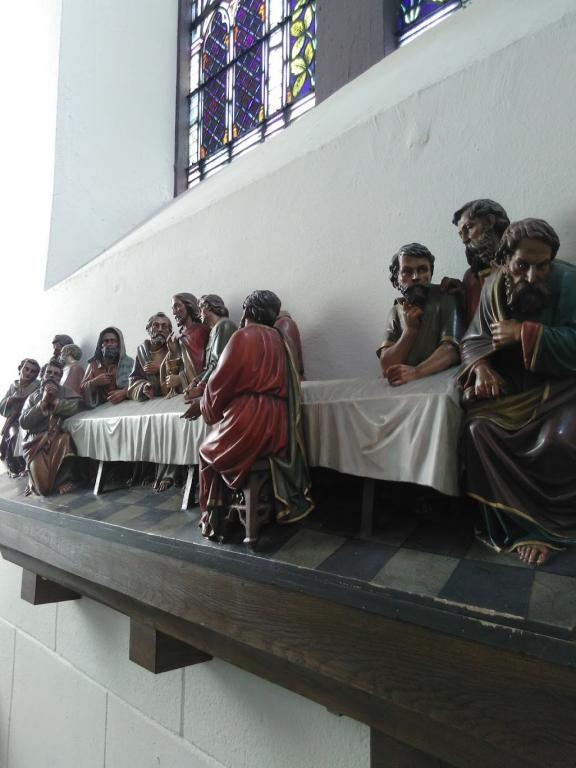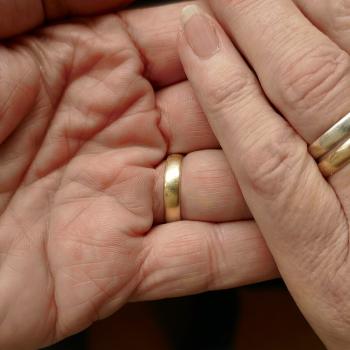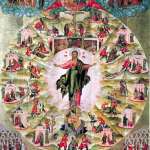I had a lovely evening last night at Bible study with a group of moms who are just . . . Catholic.
We were not there as women of the “left” or “right” — though no doubt each of us hold points of view that might lean one way or the other. We were there as regular people who love God as well as we can and try to live a good life.
It was a refreshing counterpoint to something another just-plain-Catholic friend had shared recently. The commentary was from a noted Catholic personality who had once been entrenched in the emotional whirlwind of a particular Catholic tribe (doesn’t matter which), and now was writing a bitter attack on those who could in any way be lumped with his former crowd.
It became clear that this person had been so wrapped up in the mindset conformity of his previous associates that he truly believed everyone who agreed with any aspect of that subculture’s beliefs or preferred practices must also be part of the cult.
That’s silly just as a question of probabilities. Whether you are looking at ideologues on the right or the left, at least some of their ideas are bound to be true, and many of their personal preferences (music, liturgy, devotions) are valid options.
It was clear, though, that this person had once been involved in a toxic subgroup. Let’s talk about that.
How do you tell the difference between healthy and unhealthy Catholic belief circles?
I call it a “belief circle” because there is quite a lot of perfectly acceptable variation in Catholic belief and practice. Our essential beliefs are laid out in documents like The Catechism of the Catholic Church. Our essential worship practices are laid out in officially promulgated liturgical documents. The array of approved devotions is easy enough to smack into every which way you turn.
In contrast, we are free as individuals to have all kinds of preferences. We’re free to hold a variety of theological opinions on matters that aren’t (yet) settled doctrine, as long as we accept that at a later date we may need to adjust our opinion as new information comes along. Likewise, we can have any number of opinions on what public policy positions best align with our Catholic faith.
As a result, of course there will always be social groups within the Church — some formal orders and institutions, others just a group of friends who hang out together — that tend to have a certain like-minded spirit about various matters up for debate. What are the warning signs such a group has grown spiritually unhealthy?
Others who take another approach are demonized.
It’s just fine, for example, to promote a specific form of the liturgy (either currently approved or which you are asking to be approved in the future). The toxic turn is when appreciation for your thing becomes an attack on the character of others who have positive, wholesome reasons for loving a different thing.
Even when you genuinely believe your opponent is sorely mistaken about a serious matter (worship is a serious matter!), explaining your reasoning shouldn’t involve slandering another’s character.
A long list of options are packaged together and declared mandatory.
To be clear, certain devotions tend to flock together. It’s not a surprise when someone who loves a guitar Mass also thinks plains-clothes nuns are fine and good, or when someone who loves Latin and chant is also a fan of chapel veils. No red flags there.
The red flag is when acceptance into the social circle requires checking off on absolute adherence to a long list of approved opinions, and any variation makes you one of the enemy.
Immoral acts are approved, even required, “for the greater good.”
The Catholic faith makes serious demands on us, and often in areas where we least wish to be heroic. Most of us struggle with living up to our ideals. That’s why we need a Savior!
It’s not uncommon, therefore, for any group of like-minded Catholics to have some blind spots. In my Bible study group mentioned above, we’re all middle-aged, professional-class suburban moms. Without a doubt there are things we consider perfectly normal that we just never really question too deeply, ensconced as we are in our cultural milieu.
That’s not a red flag, it’s just a normal challenge for every Christian who ever lived. It’s therefore good to question ourselves and try to step outside our usual perspective as much as we can.
A spiritually healthy Catholic is open to hearing hard teachings, even if we struggle to see our way towards how to follow them.
A toxic group, in contrast, will pressure members to commit or cover-up blatantly immoral deeds. This could be in order to protect the “reputation” of someone the group considers an important leader, or it could be as part of an effort to prevent conflict or difficulties of some nature.
The group might also advocate in favor, as a policy practice, of certain sins specifically prohibited in authoritative guides such as The Catechism, in order to achieve other goals the group (or leader) determines to be more important.
This amounts to an outright rejection of the Catholic faith, even if it is couched in spiritual terms.
Why do people get drawn into Catholic ideological cults?
Without proposing an exhaustive list of all the reasons someone might be attracted to an almost cult-like experience of Catholicism, let me throw out a few possible reasons people get sucked into toxic cliques:
#1 They grew up with bad intellectual moorings, and are seeking authoritative teaching.
One day you wake up and realize you’ve spent your whole life sucked into a set of poorly-developed beliefs that honestly make no sense. It’s natural to flee from that.
#2 They are attracted to what is true, beautiful, and good in the group.
Admit it. There is something compelling and desirable in what those crazy people over there have on offer. No one signs up for the pod-people unless they see something valuable in what the pod is doing.
#3 They are attracted to the confidence and enthusiasm of the group.
When we’re looking for answers, we gravitate towards people who really seem to know what they are talking about. Catholic cliques are often fueled by people who have done extensive theological, historic, or scientific study to support their point of view.
Whether that study is rigorous and defensible is a question the newcomer may or may not be able to assess.
#4 They are outnumbered by crazy-pants folk on the other side.
Whether it’s nutso people in the wider community or a parish or diocesan environment that skews hard in one direction or another, sometimes people find themselves drowning in what is obviously nonsense. The small group of rebels who go against the grain can be a breath of fresh air.
#5 These people showed some love.
Sometimes you fall in with a clique that might be a little nutty, but at least they are nice to you. In the loneliness of the shadow parish, anyone at all who gives you the time of day can be a real lifeline.
Where do you find just plain Catholics?
When you are trapped in a toxic social circle, it can feel (thanks to the groups’ ethos of demonizing all questioners) like you have to cling to the lifeboat despite its significant problems because every other option is worse.
It’s true that sometimes there just aren’t great parishes in your area, though hopefully it’s not as bad as all that.
It’s also true that even a well-meaning, pretty-good parish can do some significant spiritual damage to a vulnerable person, when conditions line up just wrong.
Still, it’s worth fighting for your sanity rather than falling into a toxic clique. Where do you find normal Catholics?
- Among laypeople quietly minding their own business in the pews, or carrying out low-profile ministries that do good stuff.
- Among clergy quietly leading parishes and dioceses without much fanfare.
Online and in the works of Catholic publishers there are many, many ordinary Catholics who just believe the Catholic faith and do their best to proclaim it. They often won’t have as large of followings because they don’t resort to rage bait, and not every writer or podcaster is going to be your cup of tea. But look for people who:
- Accept and believe the Catholic faith as taught, rather than trying to weasel excuses for why their pet sin is good, actually;
- Have positive reasons for the positions they encourage, rather than attacking opponents with slurs and vilification, and enjoy thoughtful discussions and good-hearted debate;
- Have a sense of humor and humility about their own limitations.
Of course all the ordinary Catholics, whether in the public sphere, parish leadership, or just sitting near you at a random Mass, are going to have faults. We’re normal, fallible people.
But with prayer and perseverance you can find companionship in healthy spiritual friendships with others who also just want to love God as best they can.
Carving of the Last Supper on display in 2016 at the Catholic parish in Munster, France; photo by me.



















